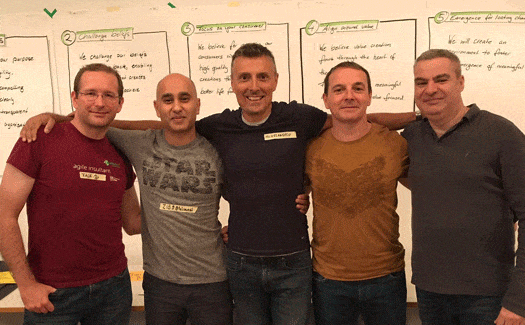Scrum Coaching Retreat Copenhagen 2017
The Scrum Coaching Retreats are a safe place for coaches to get together and share deep learning, develop their understanding and improve the world of agile coaching. These events are highly successful not least because of the amazing people, the great ideas and the nurturing environment created by all. The outcomes of the retreat are shared publically so that everyone can benefit and make such outcomes even better. The purpose is to simply provide tangible usable value that can help transform the world of work.
The Copenhagen retreat was a place to discover new ideas and bring to bear old ones. For too long, enterprise coaches have been discussing scaling frameworks as the main focus and approach for an enterprise to adopt agility. While we do believe tools and processes have value, there has been, for too long, something missing in our narrative when fostering enterprise agility in organisations.
This is what five like-minded people believed at one crucial event that brought them together to explore deeply what enterprise agility meant, both individually and collectively. Michelangelo Canonico, Falk Kühnel, Tom Reynolds, Craig Pearson and Zia Malik met and spent a number of sprints collaborating, validating and evolving their understanding based on deep experiences spanning many years of what makes a real difference in enterprises when they begin an Agile transformation, as well as many of the pitfalls that cause them to fail.
The 10 principles of enterprise agility were born. Their purpose is simply this, that Agile coaches understand, through a deep coaching mind-set, what they and the organisation should be principally focused on when adopting enterprise agility.
These 10 principles should be seen as deeper coaching ideals that move beyond scaling frameworks or patterns instilling deeper principles in the pursuit of organisational independence and growth. Its purpose is to keep organisations reaching for increased agility, for people to flourish and own their relentless improvement and for coaches to stay in the liminal space ultimately making themselves redundant. Success only comes when an enterprise flourishes through self learning loops without being dependent on external help.
Although we arrived at these 10 principles in the short time we were together, we are sure these are not the only ones. These were the most crucial we felt evolved out of our conversations.
We invite feedback and we hope that you can sign up to agreeing with and apply our principles which, although created by five individuals, belongs to us all and always open to improvement.
Author: Zia Malik


